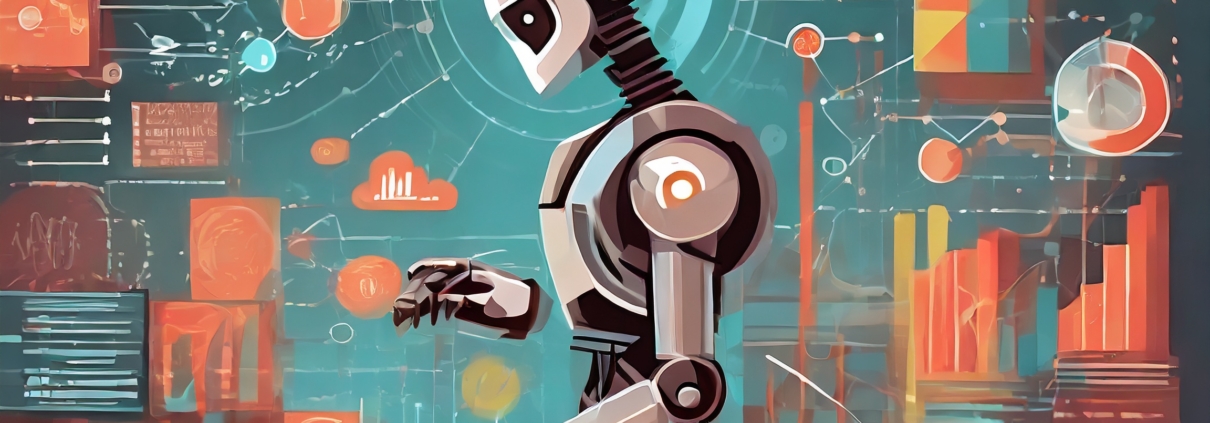Shining Star Artificial Intelligence – Impact of AI on Innovations 2023
Artificial Intelligence (AI) had a profound impact on innovation across various industries in 2023. Its ability to analyse large datasets, learn from patterns, and make predictions or decisions without explicit programming has led to transformative changes. Similar to IoT or digitalisation 5 to 10 years ago, Artificial Intelligence is leaving its mark on new business ideas seeking successful innovation and corresponding market success. Below is a brief overview of major developments we observed in 2023, driven by AI.
Automation and Efficiency:
AI enables the automation of routine and repetitive tasks, freeing up human resources to focus on more creative and strategic aspects of innovation. This increased efficiency allows for faster development and implementation of new ideas (Example: BlueCallom).
Data Analysis and Insights:
AI excels at analysing vast amounts of data quickly and extracting valuable insights. This capability facilitates data-driven decision-making, enabling businesses to identify trends, understand customer behaviour, and uncover opportunities for innovation (Example: Salesforce Analytics).
Predictive Analytics:
AI algorithms, particularly those based on machine learning, can predict future trends, consumer preferences, and market changes. This predictive capability assists businesses in anticipating demand and adjusting their innovation strategies accordingly (Example: Netflix’s content recommendation system).
Personalisation and Customisation:
AI is instrumental in creating personalised user experiences. In sectors like e-commerce, entertainment, and marketing, AI algorithms analyse user preferences to provide tailored recommendations, leading to innovative and customised products or services (Google and many others).
Natural Language Processing (NLP):
NLP allows machines to understand and interpret human language. This technology is driving innovations in voice-activated assistants, chatbots, and language translation services, enhancing communication and accessibility (Example: Open-AI’s GPT-3).
Robotics and Automation:
AI is a key driver in robotics, leading to innovations in automation, autonomous vehicles, and smart manufacturing. These technologies improve efficiency, reduce errors, and enable the development of new products and services (Example ABB).
Drug Discovery in Healthcare:
AI accelerates drug discovery by analysing biological data, identifying potential drug candidates, and predicting their effectiveness. This has the potential to revolutionise healthcare by expediting the development of new treatments (Example: Pfizer Tumor Therapies)
Creative Assistance:
AI tools are increasingly used in creative fields such as art, music, and design. They can assist artists and designers by generating ideas, suggesting improvements, and even creating original works, contributing to innovative outcomes (Example: Midjourney art AI generators)
Fraud Detection and Security:
In sectors like finance and cybersecurity, AI is used for fraud detection and threat analysis. The ability to recognise patterns indicative of fraudulent activity enhances security measures and safeguards against innovative forms of cyber threats (Example: IBM’s Watson for Cybersecurity).
Supply Chain Optimisation:
AI optimises supply chain operations by predicting demand, managing inventory, and improving logistics. This results in cost savings, reduced waste, and the ability to adapt quickly to changing market conditions (Example: DHL’s Resilience360).
Healthcare Diagnostics:
AI is making significant strides in medical diagnostics by analysing medical images, identifying patterns, and assisting in the early detection of diseases. This can lead to more timely and effective treatments (Example: Aidoc).
Continuous Learning and Adaptation:
AI systems can continuously learn from new data, adapting and improving over time. This adaptability is crucial for staying relevant in dynamic environments, fostering a culture of ongoing innovation and improvement.
The above represents just a small selection of sectors where we observe the impact of AI on new innovations. Numerous other sectors are implementing AI to generate novel ideas and propel innovations to be launched in the market.
Not every innovation involving AI is guaranteed success on the market. While AI presents numerous opportunities for innovation, it also raises ethical considerations, such as algorithmic bias, job displacement, and privacy concerns. Addressing these challenges is crucial to ensuring that AI-driven innovations are accepted in the market and contribute positively.



